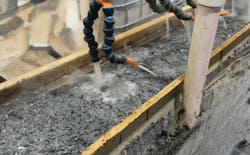HydroBlox turns film waste into drainage products
By The Recycling Partnership
HydroBlox, a Pittsburgh-based drainage solution company, lives up to its tagline: “100 percent recycled, and it works better.”
As an alternative to drainage pipes, HydroBlox manufactures permeable products that channel water away from roads, parking lots, yards and other areas prone to flooding or stormwater runoff. The products are made entirely of postconsumer plastic, including difficult-to-recycle packaging like coffee bags and snack pouches that are made of multilayer film.
The company molds shredded plastic into durable blocks and slabs designed for effective drainage using a patented process that combines heat and pressure.
“All we have to do is stand still, and more trucks show up on our loading docks filled with that type of film,” HydroBlox CEO Ed Grieser says. “What we’re taking in, all of it is landfill-bound—all of it. And we’re able to redirect that.”
Grant(ed) help
An April 2024 grant from The Recycling Partnership’s (TRP’s) Film & Flexibles Recycling Coalition enabled the installation of a film and fiber shredder along with the necessary electrical upgrades. The new shredder allows HydroBlox to process an additional 3,000 tons of film and flexible packaging annually, a 50 percent increase from its previous capacity.
“Certainly, recycling this material is the right thing to do, and from a business perspective, now that we have this really dialed in, we’re able to make our end product at just about the same rate as we were when we were using the mixed array of plastics,” Grieser says.
When HydroBlox was established more than a decade ago, Grieser says the company was buying regrind, or postindustrial plastic flakes, and integrating that material with virgin plastic for its products.
In addition to reusing material, HydroBlox says its drainage solution products are more durable than conventional drainage pipes that can be subject to crushing over time.
Eager suppliers
“No one took us very seriously,” Grieser says. “As we grew and people realized that we could take all this difficult-to-handle plastic, the tide turned. It turned slowly, but it definitely turned.”
Grieser says he’s receiving calls from recyclers and others who are eager to send HydroBlox their collected plastic material.
HydroBlox has gone from using about 30 percent plastic scrap in its products to 100 percent postconsumer film and flexibles. According to Grieser, the biggest bottleneck has been getting the material shredded, but the grant from Washington-based TRP is helping to ease that, with the equipment expected to be operational this year.
“It’s exactly what we needed in the time frame that we needed it,” Grieser says.
For more information
HydroBlox, Pittsburgh, 724-719-2660, www.hydroblox.com
The Recycling Partnership, Washington, 877-514-8774, www.recyclingpartnership.org
This article was submitted by The Recycling Partnership and appeared in the spring 2025 issue of Plastics Recycling, a joint publication of Plastics Machinery & Manufacturing and Recycling Today.
